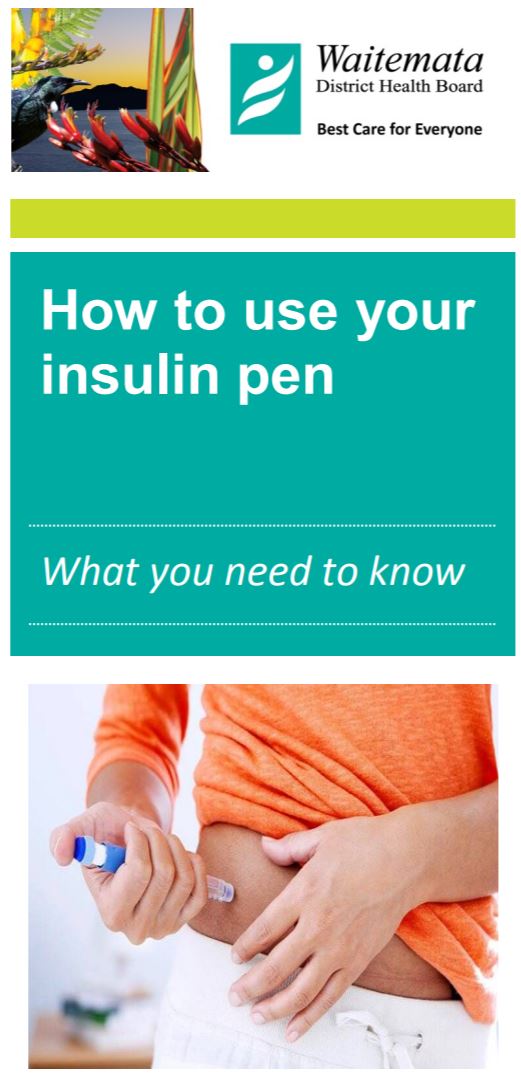You can now add Healthify as a preferred source on Google. Click here to see us when you search Google.
Starting insulin for people with type 2 diabetes
Key points about starting insulin for type 2 diabetes
- Insulin therapy helps prevent diabetes complications by keeping your blood glucose levels within your target range
- Many people with type 2 diabetes (mate huka momo tuarua) are able to control their blood glucose with diabetes tablets, healthy eating and regular exercise.
- But over time, some people with type 2 diabetes will need to use insulin as well. This is because the pancreas slows down and produces less insulin on its own.

Having constantly raised blood glucose levels damages your blood vessels and nerves, leading to problems affecting your kidneys, feet and eyes. Your risk of stroke and heart attacks also increases. Insulin therapy helps prevent diabetes complications by keeping your blood glucose within your target range. Because insulin helps to move the glucose from your blood into your cells, you may also feel better and have more energy once you start on insulin. Taking insulin may mean you can stop taking, or reduce the dose of some of your tablets.
Delaying starting insulin can result higher blood glucose, increasing the risk of developing or worsening diabetes-related complications.
Starting insulin to manage type 2 diabetes may seem scary and overwhelming at first, but your GP or diabetes nurse will provide support and information. They will guide you with injecting insulin, blood glucose monitoring and finding a treatment routine to suit your lifestyle.
Sometimes, people find that writing a list of questions and concerns is a useful way of processing some of their concerns. Remember, there are no silly questions or concerns – they are all valid. Your health professional will appreciate anything you mention, as it will help them to offer you the best possible support.
Most people start off injecting insulin once a day, at bedtime. This is because your body makes glucose during the night, causing your blood glucose levels to be higher in the morning.
You will most likely start on a long-acting insulin. An evening dose of a long-acting insulin helps to keep blood glucose levels stable overnight. A few people find that their blood glucose levels are highest later in the day. In these people, it's best to start insulin in the morning. Some people may need to use insulin 2 or more times a day to get better glucose control. It usually takes a few weeks to get your dose and timing right. Insulin comes in fast, intermediate, and long-acting forms. Your doctor or diabetes nurse will discuss the options with you. Read more about types of insulin.
When you first start insulin, you need to test your blood glucose at least 3 to 4 times a day, but once you have found the insulin dose that suits you best, you may be able to test less often.
Testing your blood glucose levels at home enables you to monitor the effects of insulin on your blood glucose levels. Every time you test, record your results in a diabetes diary. Some blood glucose meters record your blood glucose levels automatically. Your diary can also help you keep track of events, such as if you had hypoglycaemia (a hypo or low blood glucose). All this information helps with making decisions about the best treatment for you. Read more about blood glucose testing and hypoglycaemia.
The following link provides further information on insulin
Diabetes New Zealand(external link)
Resources
5 questions to ask about your medications(external link) Health Quality and Safety Commission, NZ, 2019 English(external link), te reo Māori(external link)
References
- Type 2 diabetes management guidance(external link) NZSSD
- Type 2 diabetes(external link) Midland Community HealthPathways
- Initiating insulin for people with type 2 diabetes(external link) BPAC, NZ, 2022
Brochures

Waitemata DHB, NZ, 2020

Health Quality and Safety Commission, NZ, 2019
English(external link)Te reo Māori(external link)
Credits: Healthify He Puna Waiora editorial team. Healthify is brought to you by Health Navigator Charitable Trust.
Reviewed by: Claire Salter, Pharmacist, Tauranga
Last reviewed:
Page last updated:





